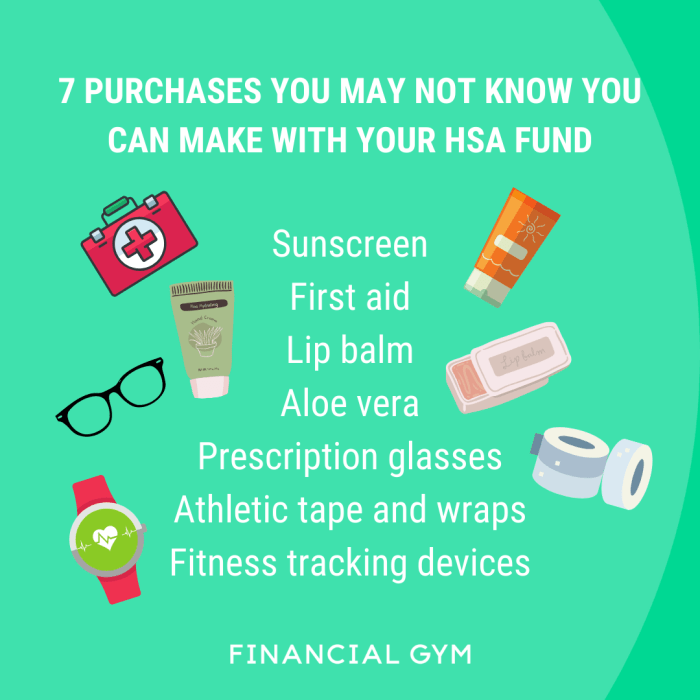The question of whether you can use a Health Savings Account (HSA) to pay your health insurance premiums is a common one, often shrouded in complexity. Understanding the nuances of HSA regulations is crucial for maximizing your healthcare savings. This guide unravels the intricacies, exploring the eligibility requirements, limitations, and tax implications of using HSA funds for premiums, ultimately empowering you to make informed financial decisions regarding your healthcare.
We’ll delve into the specific IRS regulations governing HSA usage, comparing the tax advantages and disadvantages of utilizing HSA funds for premiums versus other healthcare expenses. Through practical scenarios and a step-by-step guide, we’ll illuminate the process of using HSA funds for premiums and help you calculate potential savings. We’ll also explore alternative uses for your HSA funds and address potential penalties for misuse.
HSA Eligibility and Insurance Premiums

Health Savings Accounts (HSAs) offer a tax-advantaged way to save for healthcare expenses, but eligibility is restricted to individuals enrolled in specific health insurance plans. Understanding these eligibility requirements and the nuances of using HSA funds for insurance premiums is crucial for maximizing the benefits of this valuable tool.
HSA Eligibility Requirements
To be eligible to contribute to an HSA, you must be enrolled in a high-deductible health plan (HDHP) and meet several other criteria. These criteria ensure that HSAs are used for their intended purpose – supplementing healthcare costs after a significant deductible is met, not as a general-purpose health savings vehicle. You must be covered under a HDHP that meets the IRS’s minimum deductible and out-of-pocket maximum requirements. Importantly, you cannot be enrolled in other health coverage (like Medicare or Medicaid) that is considered “minimum essential coverage.” You also cannot be claimed as a dependent on someone else’s tax return. Finally, you cannot have other health coverage besides the HDHP, with some exceptions for limited situations like a short-term health plan.
HSA-Compatible Health Insurance Plans
HSAs are designed to work in conjunction with high-deductible health plans (HDHPs). These plans have higher deductibles than traditional health insurance plans, meaning you pay more out-of-pocket before your insurance coverage kicks in. However, they typically offer lower premiums than lower-deductible plans. The specific deductible and out-of-pocket maximum amounts for an HDHP vary annually and are determined by the IRS. For example, in a given year, the minimum deductible might be $1,500 for an individual and $3,000 for a family, with corresponding out-of-pocket maximums. Meeting these requirements ensures your HDHP is compatible with an HSA.
Comparison of HSA-Compatible and Non-Compatible Plans
| Feature | HSA-Compatible Plan (HDHP) | Non-HSA-Compatible Plan |
|---|---|---|
| Deductible | High (e.g., $1,500 – $7,000+) | Low to moderate |
| Premiums | Generally lower | Generally higher |
| Out-of-Pocket Maximum | High (e.g., $7,000 – $28,000+) | Lower |
| HSA Eligibility | Eligible | Not eligible |
| Cost Savings Potential | Significant long-term savings with HSA contributions | Less potential for tax-advantaged savings |
Using HSA Funds for Insurance Premiums
Generally, HSA funds cannot be used to pay insurance premiums. The IRS specifically prohibits this. The purpose of an HSA is to pay for qualified medical expenses incurred *after* the deductible is met. Premium payments are considered a cost of maintaining insurance, not a direct medical expense. For example, you can use HSA funds to pay for doctor visits, prescription drugs, or hospital stays *after* your deductible has been satisfied, but not to pay your monthly insurance premium. One exception might be if you have a health plan with a health reimbursement arrangement (HRA) that specifically allows HSA funds to be used for premiums, but this is not a common occurrence.
Using HSA Funds for Insurance Premiums
Using a Health Savings Account (HSA) to pay for health insurance premiums offers potential tax advantages, but it’s crucial to understand the IRS regulations and limitations governing this practice. While not all health insurance premiums are eligible for HSA payment, understanding the rules can help you maximize your HSA benefits.
IRS Regulations on Using HSA Funds for Insurance Premiums
The IRS allows the use of HSA funds to pay for certain health insurance premiums, specifically those for plans that meet the requirements of a qualified high-deductible health plan (HDHP). This means your health insurance plan must have a high deductible and generally limit out-of-pocket expenses to a specific amount. The specific deductible and out-of-pocket maximum amounts are adjusted annually by the IRS and are available on their website. Crucially, only premiums for plans considered “minimum essential coverage” under the Affordable Care Act (ACA) are eligible. This ensures that the HSA funds are used for legitimate healthcare purposes. Using HSA funds for premiums that do not meet these criteria could result in tax penalties.
Restrictions and Limitations on Using HSA Funds for Premiums
Several restrictions apply to using HSA funds for insurance premiums. First, as mentioned, the health insurance plan must be a qualified HDHP. Second, the premiums must be for coverage of the account owner, their spouse, and/or their dependents. Premiums paid for other individuals are not eligible for HSA reimbursement. Third, the HSA funds can only be used to pay for health insurance premiums *after* the deductible on the HDHP has been met in some cases, depending on the specific plan. This is because the HSA is primarily intended to cover out-of-pocket medical expenses, and using it for premiums before the deductible is met could be seen as circumventing the system. Lastly, there are annual contribution limits for HSAs, and exceeding these limits can lead to penalties.
Tax Implications of Using HSA Funds for Premiums
The tax advantages of using HSA funds for premiums are significant. Contributions to an HSA are often tax-deductible (depending on your individual circumstances and contribution method), the funds grow tax-free, and withdrawals for qualified medical expenses, including eligible premiums, are tax-free. This contrasts sharply with paying premiums directly from taxable income, where the premium payments are not tax-deductible. Using HSA funds for other qualified medical expenses, such as doctor’s visits or prescription drugs, also offers the same tax advantages.
Tax Advantages and Disadvantages: HSA Premiums vs. Out-of-Pocket Medical Expenses
| Feature | Using HSA for Premiums | Using HSA for Out-of-Pocket Expenses | Using Taxable Income for Premiums |
|---|---|---|---|
| Tax Deductibility of Contributions | Often tax-deductible | Often tax-deductible | Not tax-deductible |
| Tax-Free Growth | Yes | Yes | No |
| Tax-Free Withdrawals (for qualified expenses) | Yes | Yes | No |
| Potential Penalty for Non-Qualified Withdrawals | Yes (income tax plus 20% penalty) | Yes (income tax plus 20% penalty) | N/A |
Practical Applications and Scenarios

Understanding when using an HSA for insurance premiums is advantageous requires careful consideration of individual circumstances and financial situations. The benefits are not universally applicable, and a thorough evaluation is crucial before implementing this strategy. This section explores scenarios where utilizing HSA funds for premiums proves beneficial and others where it might not be the most effective approach.
Beneficial Scenario: High Deductible Health Plan with Predictable Expenses
Imagine Sarah, a 30-year-old with a high-deductible health plan (HDHP) and a history of consistently low healthcare costs. She contributes the maximum amount allowed to her HSA annually. She anticipates needing only routine check-ups and preventative care, expenses easily covered by her HSA. Paying her insurance premiums with HSA funds allows her to effectively reduce her out-of-pocket costs for the entire year, building a substantial balance for future healthcare expenses. This strategy offers a significant tax advantage, as both contributions and earnings grow tax-free. Her predictable healthcare spending makes this a financially sound decision.
Non-Beneficial Scenario: High Healthcare Costs and Unpredictable Expenses
Conversely, consider John, a 55-year-old with a pre-existing condition requiring frequent medical treatments and hospitalizations. He also has a high-deductible health plan. While he contributes to his HSA, his unpredictable and substantial healthcare expenses far exceed his HSA contributions and earnings. Using HSA funds for his premiums leaves him with insufficient funds to cover his actual medical bills, resulting in a net financial loss. In this case, paying premiums directly and maintaining a larger balance in the HSA for medical expenses would be a more prudent strategy.
Step-by-Step Guide to Using HSA Funds for Insurance Premiums
Using HSA funds for insurance premiums requires a specific process. The feasibility depends on your insurance provider’s acceptance of HSA payments.
- Verify Eligibility: Confirm with your insurance provider that they accept HSA payments for premiums.
- Gather Necessary Information: Obtain your HSA account information (account number, routing number) and your insurance policy information.
- Contact Your Insurance Provider: Inquire about the process for making HSA premium payments. They may provide specific instructions or a designated payment portal.
- Initiate Payment: Follow your insurance provider’s instructions to submit your HSA payment. This might involve online transfers, mailing a check from your HSA, or using a third-party payment platform.
- Maintain Records: Keep detailed records of all transactions, including payment confirmations, to ensure accurate tracking of HSA funds.
Calculating Potential Savings from Using an HSA for Insurance Premiums
Calculating potential savings involves comparing the total cost of insurance premiums paid directly versus those paid using HSA funds.
Total Savings = (Annual Insurance Premium Cost) – (Annual HSA Contribution Deduction) + (Annual HSA Investment Earnings)
For example, if your annual premium is $3,600 and you contribute $3,600 to your HSA (deductible from your taxable income), and your HSA earns $100 in interest, your potential savings could be: $3600 – $3600 + $100 = $100. The actual savings are dependent on your tax bracket and investment returns. This example illustrates the tax advantage of HSA contributions, but the net savings from using HSA funds to pay premiums directly depends on individual circumstances and investment performance.
Alternative Uses of HSA Funds
While using HSA funds for insurance premiums offers a valuable way to proactively manage healthcare costs, it’s only one piece of the puzzle. Understanding the broader range of eligible expenses allows for a more comprehensive strategy in leveraging your HSA. This section explores alternative uses and helps determine the optimal allocation of your HSA funds.
HSA funds offer considerable flexibility in managing healthcare expenses. Comparing the use of HSA funds for premiums versus other eligible expenses requires careful consideration of your individual circumstances and financial goals. A balanced approach can maximize the benefits of your HSA.
Comparison of HSA Fund Usage for Premiums and Other Expenses
Using HSA funds for insurance premiums offers a proactive approach to managing healthcare costs, paying for coverage upfront. This differs from using HSA funds for expenses like deductibles, co-pays, or prescriptions, which address costs incurred *after* services are received. The choice depends on your risk tolerance and prediction of future healthcare needs. Paying premiums reduces the immediate financial burden of insurance, while paying for other expenses addresses immediate medical bills. The optimal strategy often involves a combination of both approaches.
Examples of Alternative HSA Expenses
HSA funds can cover a wide array of qualified medical expenses. These include, but are not limited to:
- Deductibles: The amount you pay out-of-pocket before your insurance coverage kicks in. For example, if you have a $2,000 deductible and incur $3,000 in medical bills, you can use your HSA to pay the $2,000 deductible.
- Co-pays: The fixed amount you pay for a doctor’s visit or other medical service. These can add up over time, and your HSA can help cover these costs.
- Prescription Drugs: The cost of prescription medications, both brand-name and generic, is often a significant healthcare expense. HSA funds can be used to pay for these drugs.
- Over-the-Counter Medications: Certain over-the-counter medications, such as insulin, are eligible for HSA reimbursement when prescribed by a doctor.
- Vision Care: Expenses related to eyeglasses, contact lenses, and eye exams can be paid for with HSA funds.
- Dental Care: Dental expenses, including cleanings, fillings, and other procedures, are also eligible HSA expenses.
Factors to Consider When Choosing Between HSA Uses
Several factors influence the decision of whether to prioritize insurance premiums or other healthcare costs when using HSA funds. These include:
- Projected Healthcare Needs: If you anticipate significant medical expenses in the coming year, it might be wise to allocate more funds towards deductibles and co-pays. Conversely, if you expect relatively low healthcare costs, paying premiums upfront might be a better strategy.
- Insurance Plan Design: The specifics of your health insurance plan, such as the deductible amount and co-pay structure, will significantly impact your spending. A high deductible plan might encourage prioritizing deductible payments over premiums.
- Financial Resources: Your overall financial situation influences your choices. If you have limited savings, paying premiums upfront might provide financial security. If you have a robust emergency fund, you might feel more comfortable using HSA funds for other immediate expenses.
- Tax Advantages: Remember that HSA contributions are tax-deductible, and the funds grow tax-free. This makes using them for any eligible medical expense beneficial, regardless of your spending strategy.
Penalties for Improper HSA Fund Usage
Improper use of HSA funds can result in significant tax penalties. Using HSA funds for non-qualified expenses, such as groceries or clothing, will result in taxation of the withdrawn amount, plus an additional 20% penalty. This penalty is waived only in cases of death or disability. It’s crucial to keep meticulous records of all HSA transactions to ensure compliance.
Illustrative Examples (without actual images)
Understanding how HSA funds flow and the cost savings they offer requires visualizing the process and comparing different scenarios. The following examples illustrate these concepts without using actual images, relying instead on detailed descriptions.
To better grasp the financial implications, let’s consider two illustrative examples focusing on the utilization of HSA funds for healthcare expenses, specifically insurance premiums. These examples will highlight the potential cost savings achievable through strategic use of an HSA.
HSA Fund Flow Visualization
Imagine a flowchart depicting the movement of funds from your HSA account. The flowchart would begin with a box representing your HSA balance. From this central box, several arrows would branch out, each leading to a different category of healthcare expense. One arrow would clearly indicate “Insurance Premiums,” connecting to a box showing the premium amount deducted from your HSA. Other arrows would point to boxes representing other common healthcare expenses like doctor visits, prescriptions, and dental care. The remaining balance in your HSA would be shown in a final box, representing the funds left after all expenses are accounted for. This visual would clearly show how HSA funds are allocated across various healthcare needs, with insurance premiums being one significant component.
Cost Savings Comparison: Using HSA vs. Traditional Payment
Consider two scenarios: one where you pay your insurance premiums directly from your personal checking account, and another where you use HSA funds to cover the premiums.
- Scenario 1: Traditional Payment: Let’s say your monthly insurance premium is $300. Over a year, this totals $3600. This amount is directly deducted from your checking account, impacting your disposable income. Any medical expenses incurred beyond the premium would be additional out-of-pocket costs.
- Scenario 2: HSA Payment: In this scenario, you contribute $300 monthly to your HSA (or more, depending on your contribution strategy). Your insurance premium is paid directly from the HSA. The same $3600 annual premium is paid, but it comes from pre-tax dollars, effectively reducing your taxable income. Furthermore, any additional medical expenses can also be paid from the HSA, further reducing out-of-pocket costs. The tax savings associated with the pre-tax contributions to the HSA and the potential tax-advantaged growth within the HSA itself represent significant additional savings beyond simply diverting the premium payment from your checking account.
The comparison would clearly show that using an HSA not only shifts the payment method but also offers significant tax advantages, resulting in substantial overall cost savings compared to paying premiums directly from after-tax income. The exact savings will depend on individual tax brackets and HSA contribution levels. For instance, a person in a higher tax bracket would realize a more significant reduction in their overall tax burden by using an HSA compared to someone in a lower tax bracket.
Last Recap

Successfully navigating the world of HSAs and insurance premiums requires a clear understanding of eligibility, regulations, and potential benefits. By carefully considering the factors Artikeld in this guide—including HSA eligibility, IRS guidelines, and alternative uses of HSA funds—you can optimize your healthcare spending and maximize the value of your HSA. Remember to consult with a financial advisor or tax professional for personalized guidance tailored to your specific circumstances.
Helpful Answers
Can I use my HSA to pay for my spouse’s or children’s insurance premiums?
Generally, no. HSA funds can only be used to pay for your own qualified medical expenses.
What happens if I use HSA funds for ineligible expenses?
You will be subject to income tax plus a 20% penalty on the improperly withdrawn amount.
Can I contribute to my HSA after using funds for premiums?
Yes, as long as you meet the eligibility requirements for HSA contributions (having a high-deductible health plan, etc.).
Are there any specific forms or documentation required when using HSA funds for qualified medical expenses?
While not always explicitly required, it’s advisable to keep records of your expenses and receipts for audit purposes. Your HSA provider may have specific requirements.
If I have a family plan, can I use my HSA to pay the portion of the premium that covers my family members?
No, only the portion of the premium attributable to your own coverage can be paid from the HSA.